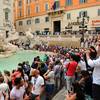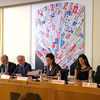European Parliament. The Right to Vote Seriously
With elections to the European Parliament looming Sunday, it’s worth recalling that Italians take their right to vote seriously. With a median turnout for European Parliamentary elections of 66.5% (78.3% for national general political elections), Italy puts to shame other European states. Second-place France averages only 45.1% (62.7) and Euro-skeptical United Kingdom, a mere 31.6% (67.4%); Germany and Spain fall between the two.
Just possibly, however, the Italian commitment to go to the polls could decline this time around. The past month’s campaign has been rife with distasteful allegations that Premier Silvio Berlusconi hosted young playmates at parties, and, now, counter-accusations that his estranged wife, Veronica, has a boyfriend. Even anti-immigrant sentiment has taken a recess as the quarrel has focused on the playmate question, which has brought worldwide negative reactions nowhere countered by attempts to defend Berlusconi’s reputation.  Furthermore, what began as the Premier’s perhaps foolish participation at an 18-year-old girl’s birthday party, then his misstating several times how he came to know her, has escalated into revelations of a Hugh Hefner-like party on his estate attended by scores of lissome young ladies, including the girl herself. At least one guest, a male chanteur and co-author of Berlusconi’s pop songs, was photographed at an airport in Sardinia descending from a military airplane, which was apparently being used, illegally, for private purposes.
Furthermore, what began as the Premier’s perhaps foolish participation at an 18-year-old girl’s birthday party, then his misstating several times how he came to know her, has escalated into revelations of a Hugh Hefner-like party on his estate attended by scores of lissome young ladies, including the girl herself. At least one guest, a male chanteur and co-author of Berlusconi’s pop songs, was photographed at an airport in Sardinia descending from a military airplane, which was apparently being used, illegally, for private purposes.
Elsewhere, as the Deputy Director of the London Times has pointed out, a politician would already have been obliged to resign. But until that photograph, the scandal mongers have offered much that was disturbing (and a heck of a lot of fun for readers), but evidence of little that was demonstrably illegal.
Mr. Berlusconi’s reputation took another blow when a Milan court convicted his British lawyer, David Mills, of receiving bribes from Berlusconi. Mr. Berlusconi himself had been a co-defendant until a law was passed, under his aegis, disallowing prosecution of a sitting senior politician. Mr. Mills had been a consultant to Mr. Berlusconi on off-shore tax havens. As a result, even Time magazine referred to Italy as “Berlusconistan.” But perhaps under the same argument which protected the Premier from prosecution in the Mills case, this too will go nowhere.
Theoretically, nevertheless, a lower turnout of disaffected conservative voters, especially ethically-minded Catholics, could affect the vote and whittle away at Mr. Berlusconi’s Partito della Libertà (PdL) and his prospects as successor to President Giorgio Napolitano.
Mr. Berlusconi himself does not expect this to happen. He sidesteps the attacks with a smile and a wisecrack and says, on the contrary, that the daily doses of nasty headlines are boomerangs turning in his favor. As the Premier told an Italian audience last week, the public opinion surveys he reads indicate his personal popularity at 70% and that in Sunday’s vote the PdL vote will make a strong showing of around 40%. His populist party—an occasionally uneasy triple axis amalgam of his personal supporters, the Northern League of Umberto Bossi and the Alleanza Nazionale of Gianfranco Fini—would therefore remain solidly in the lead while the splintered, fractious Italian left continues to wallow in acrimonious doldrums.
That Mr. Berlusconi remains popular with a substantial number of the individuals in the electorate is a fact, and he knows it; indeed, along with the judiciary system he has been attacking Parliament itself, and threatening to go directly to “the people” for legitimacy, as if “the people” had not elected the members of Parliament and the Senate.
However, no less than the gossip columnists, money talks. Here’s what it’s saying, for better and for worse, in the mouths of three of the most authoritative Italians.
1. Fiat automaker CEO Sergio Marchionne is winning kudos worldwide for saving Italy’s biggest manufacturer from bankruptcy and for sealing the merger deal with Chrysler. Marchionne, 56, was educated in Canada and had worked in both Switzerland and France before taking over Fiat just five years ago. “There was a smell of death," he told a British journalist this May, because Fiat had run up €8 billion of losses in the previous four years. To revive Fiat, "We spat blood.” Today, the company turns out 2 million cars a year, and Fiat shares have risen notably.
Mr. Marchionne cautions, however, that the entire auto industry is in dire trouble, making mergers necessary if Fiat is to remain competitive. His new agreement with Chrysler, which gives him a 20% stake in the U.S. automaker, has been praised even by the American automotive industry, but he still needs another partner. A similar deal with Opel has just foundered, and so Marchionne is known to be looking elsewhere, at Peugeot Citroen or Saab in Europe, or in Latin America. If it fails, real trouble lies ahead.
2. The respected and independent Mario Draghi, governor of the Bank of Italy, predicts a 5% or more decline by the end of this year in Italy’s GNP. Although the worst effects of the worldwide recession have been avoided so far in Italy, with no major bank failure, in the first quarter this year bankruptcy proceedings were 55% above those of the same period last year and almost all concerned small companies. Tens of thousands more jobs remain at risk, particularly in companies too small to obtain state aid. A 35-year-old geriatric hospital employee told me yesterday that he has not been paid his wages for over three months, and that he fears the worst.
3. Speaking in Trento last week, Luca Cordero di Montezemolo, president of Fiat and ex-President of the Confindustria (Italy’s association of manufacturers) listed three problems which require urgent attention:
--Unduly low tax revenues. Italy holds the European “record for tax dodging,” even though most middle- and working-class employees pay taxes.
--The economic and social gap between the Italian North and the South, the Mezzogiorno, which has increased, not decreased, in recent years. (To Montezemolo’s words I would add that this gap is aggravated by the continuing influence of organized crime. A sign of the times: the garbage pile-up in Palermo.)
--The lack of reform of Italian state bureaucracy and public administration, inefficient beyond the tolerable. Berlusconi’s own people know this, but two weeks ago Roman public high school principals called on parents to contribute cash to funds to pay for missing essential school supplies. By way of responding to their appeal, Italy’s pretty Education Minister Maria Stella Gelmini, 34, said arrogantly, “If they don’t like it, they can go work someplace else.”
Sunday’s election will tell us at the very least which matters more to voters, ethics or tolerance of human frailty, upbeat telepopulism or the dingy discipline of elementary economics. In Italy, it may not be the economy, stupid. And it is most probably not ethics, either.





































i-Italy
Facebook
Google+
This work may not be reproduced, in whole or in part, without prior written permission.
Questo lavoro non può essere riprodotto, in tutto o in parte, senza permesso scritto.